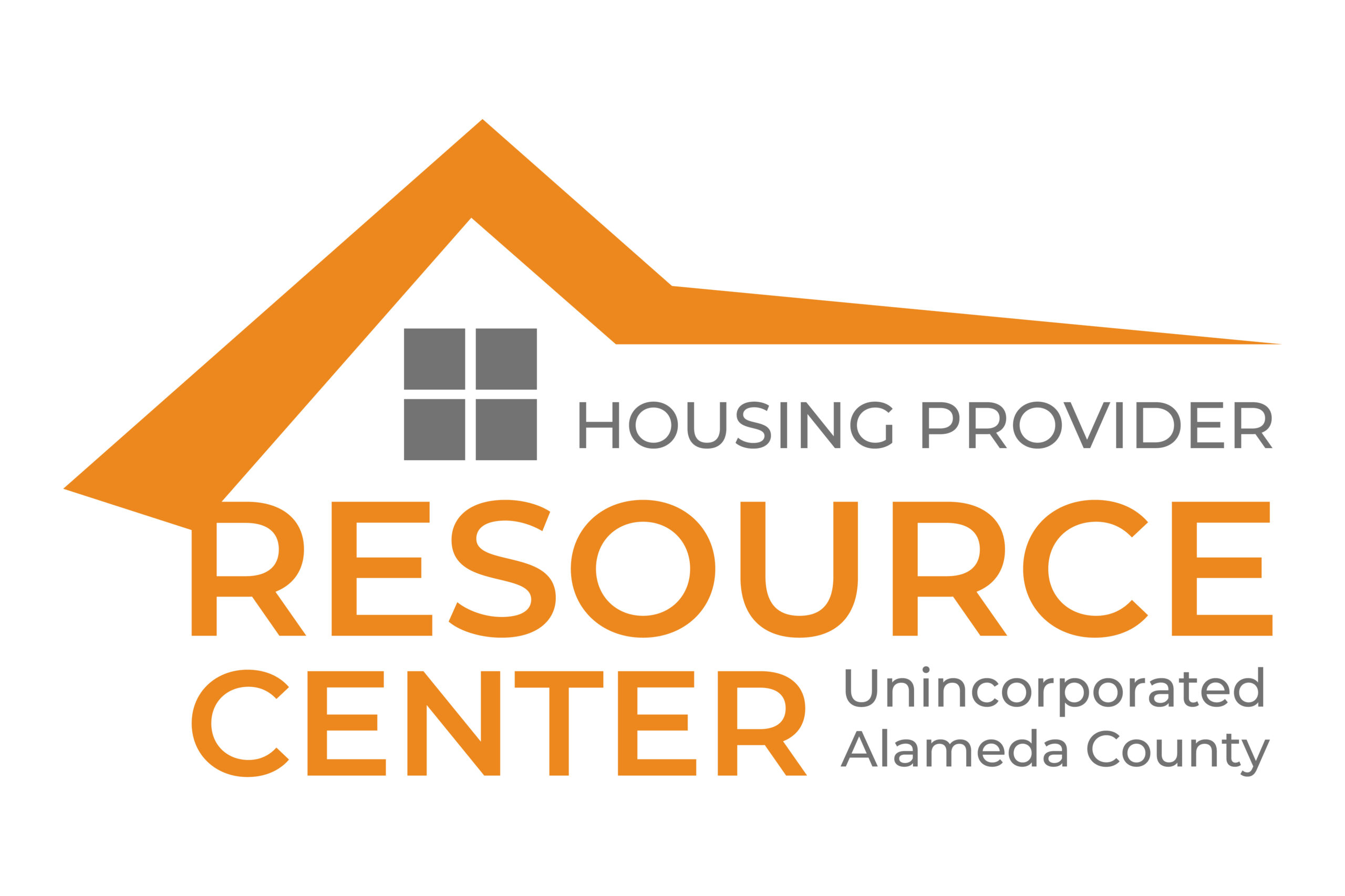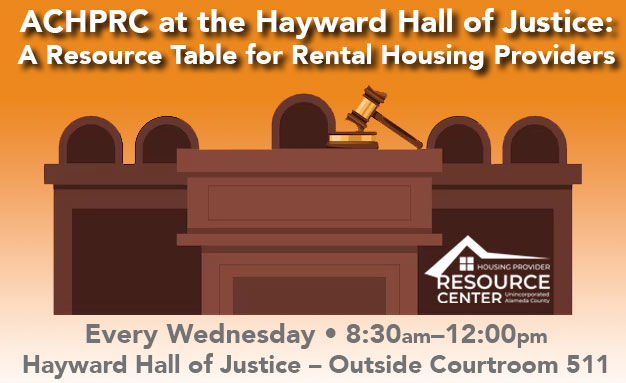Resources for Rental Property Owners and Managers
Several organizations offer a variety of resources to rental owners and managers with property in the unincorporated region of Alameda County.
Our comprehensive list of resources aim to empower you with valuable information concerning legal assistance, foreclosure resources, lead paint repair, hazardous waste disposal, and maintenance grants, and more.
If you can’t find a resource that you need, please contact us at or 510-868-0070. We are dedicated to helping your rental housing business succeed.
Renter Issues
Are you seeking assistance in resolving housing disputes with your tenant? ECHO Housing offers trained mediators and counseling to property owners![]() . Some cities and unincorporated county areas covered, others are not.
. Some cities and unincorporated county areas covered, others are not.
ECHO Housing has trained mediators to assist in resolving housing disputes through conciliation and mediation. We make referrals to legal services for advice and representation on housing-related issues including evictions, rent increases, repairs and habitability, and harassment. ECHO Housing’s Rent Review Ordinance and Tenant Protections Training or access the slide presentation: ECHO housing training for landlords![]() .
.
Eden Council for Hope and Opportunity
(ECHO Housing)
https://www.echofairhousing.org/
(510) 581-9380
Housing & Economic Rights Advocates
(HERA)
https://www.heraca.org/
(510) 271-8443, ext. 300
Rental Mediation Services Program
Center for Community Dispute Settlement
https://www.rentalmediation.
(925) 922-5410
Maintenance Grants & Renovation Resources
Maintaining and renovating rental properties is essential for attracting quality renters and preserving property value. Regular maintenance tasks, such as inspecting HVAC systems, addressing plumbing issues, and ensuring safety features like smoke detectors are operational, can prevent costly repairs and improve renter satisfaction.
When planning renovations, prioritize upgrades that enhance functionality and appeal, such as modernizing kitchens and bathrooms or adding energy-efficient features. Always obtain the necessary permits for major projects to avoid legal issues. Keep detailed records of maintenance and renovation expenses, as many may be tax-deductible.
Finally, schedule work during renter turnovers whenever possible to minimize disruption, and communicate clearly with renters about maintenance schedules to build trust and ensure compliance with local habitability standards.
Alameda County Minor Home Repair Grants
https://www.achhd.org/
Renew Alameda County – Home Repair Low Interest Loans
https://www.renewac.org
Home Upgrade Program- Alameda County
https://shorturl.at/DOmNr
Habitat for Humanity – Home Repair Program
https://www.habitatebsv.org/services/home-repair
Rebuilding Together – Safe at Home Program
https://rebuildingtogether.org/safe-at-home
Mortgage Assistance
Are you having trouble paying your mortgage? For many homeowners, their home is their biggest asset. To protect it, homeowners struggling to make mortgage payments should know their rights and act fast to work with their mortgage servicers to find solutions.
Homeowner’s Guide to Success
https://www.hud.gov/sites/dfiles/Housing/documents/RevUpdHmownSuc121518fnl.pdf
A-1 Community Housing – Mortgage Delinquency & Home Preservation Services
https://www.a1chs.org/home-
California Mortgage Relief Program
camortgagerelief.org
Foreclosure Resources
Are you a small low-income landlord facing foreclosure? These resources may be able to help.
Guide to Avoiding and Dealing with Foreclosure
- Tenants Rights in Foreclosed Properties
 (pdf)
(pdf) - Foreclosure Resource List for Homeowners
 (pdf)
(pdf) - Foreclosure Resource List for Tenants
 (pdf)
(pdf) - Information on California’s Foreclosure Process
 (pdf)
(pdf) - Tips for Avoiding Foreclosure
 (pdf)
(pdf)
In addition to this information, the Federal Department of Housing and Urban Development has valuable information to assist homeowners in distress.
has valuable information to assist homeowners in distress.
Evictions & Small Claims
How can housing providers minimize the risk of eviction?
Housing providers can minimize the risk of eviction by conducting thorough tenant screenings, maintaining clear and consistent communication with the renter, promptly addressing maintenance issues, and resolving disputes through mediation or negotiation whenever possible.
How long does the eviction process typically take for a housing provider in the East Bay area?
The eviction process timeline can vary depending on factors such as local court schedules and renter responses. Generally, it can take anywhere from two months to six months to complete the eviction process.
Are you seeking legal recourse for back rent? Small claims court for rental housing providers offers self-help resources![]() .
.
Small Claims Guidance on Rental Debt![]()
See Alameda County’s Flyer for the steps and deadlines in the eviction process![]()
The Self-help Desk at the Alameda County Superior Court provides legal information and resources to self-represent court customers. Assistance may be in the form of private appointments, referrals, Live Chat, and/or telephonic assistance. Self Help | Superior Court of California | County of Alameda![]()
U.S. Department of Housing & Urban Development (HUD) Meet with a HUD certified counselor to explain various options to prevent foreclosure.
Local Rental Housing Associations
The East Bay Rental Housing Association
3664 Grand Ave., Suite B, Oakland, CA 95610
Berkeley Property Owners Association
Lease Agreements
Lease agreements are EXTREMELY important in rental housing because they establish the rights and responsibilities of both the rental owner and the renter, and provide a clear understanding of what happens if either party breaks the terms.
DO NOT pull a boiler plate lease agreement from the internet. Contact your Local Rental Housing Association and obtain an updated lease agreement that is compliant with all local laws and regulations.
Here are some things that a lease agreement should include:
- Rent: The amount of rent, including the security deposit, fees, and payment terms
- Lease duration: The length of time the lease is in effect
- Maintenance and repairs: The responsibilities of each party for maintenance and repairs
- Pet policy: If the rental is pet-friendly, the policy should specify the approved pets and any fees or deposits
- Property description: A detailed description of the property, including its address and any personal property included in the lease
- Right of entry: Guidelines for when the rental owner, or property manager can enter the property
- Disruptive activities: Details on what is considered disruptive or illegal on the property
- Property damage: Details on property damage, alterations, and upkeep
- Early termination: Charges related to ending the lease early
Insurance
Several insurance companies offer rental property insurance in California, including Obie, Travelers, and Safeco. But coverage availability varies by ZIP code, so you’ll need to get a quote to know for sure which companies offer the coverage you need.
Whether you’re renting out your property in the long term (like a yearly lease) or the short term (such as a home listed on AirBnB), you’ll need to have the right insurance coverage in place to make sure you’re fully protected in case of damage or liability issues.
Owners are encouraged to have insurance for coverage against wrongful eviction especially in Just Cause/eviction controlled jurisdictions. Rent laws in California and the Bay Area make it lucrative for residents to sue owners. Many local eviction ordinances allow residents to recover damages if they prevail in litigation.
Lead Paint & Hazardous Waste
Lead Paint Hazard Repair Funding
https://www.achhd.org/
Reducing Lead Paint Hazards
https://www.achhd.org/
Hazardous Waste Disposal
https://www.stopwaste.org/at-
Lead paint and hazardous waste management are critical responsibilities for rental housing providers, especially for properties built before 1978 when lead-based paint was commonly used. Regularly inspect painted surfaces for chips or deterioration, as lead exposure can pose serious health risks. Provide renters with the federally required Lead-Based Paint Disclosure and EPA pamphlet, Protect Your Family from Lead in Your Home, before leasing. When addressing lead paint hazards or handling hazardous materials, hire certified professionals to ensure compliance with regulations and safety standards. Properly dispose of hazardous waste such as paint, chemicals, and batteries at designated facilities, and never mix these materials with regular trash. Document all abatement or waste disposal activities to demonstrate compliance and safeguard your property from potential liability.
Taxes
Rental housing income is subject to taxation, so it’s crucial for property owners to stay informed and organized to maximize deductions and remain compliant. Keep meticulous records of all rental-related income and expenses, including property maintenance, repairs, insurance, and property management fees, as many of these can be deducted to lower taxable income. Depreciation is another valuable deduction, allowing owners to spread the cost of the property over its useful life. Be mindful of tracking any upgrades or major renovations separately, as these may impact your depreciation calculations. Additionally, consider consulting a tax professional to ensure compliance with local, state, and federal tax laws and to identify any tax-saving opportunities, such as 1031 exchanges for reinvestment.
If you own rental real estate, you should be aware of your federal tax responsibilities. All rental income must be reported on your tax return, and in general the associated expenses can be deducted from your rental income.
Learn more at the IRS website:
https://www.irs.gov/businesses/small-businesses-self-employed/tips-on-rental-real-estate-income-deductions-and-recordkeeping
Selling Your Rental Property
Are you thinking of selling your rental property? Here are some tips for rental properties in California:
Consider the Market – Consider factors like cash flow, repair costs, real estate market conditions, and your investment goals.
Maintain renter relations – Give your renters time to decide if they want to move, and provide advanced notice before showings. Keep renters informed about the sale and any changes that may affect their tenancy.
Pay your renters to leave – If you would like your property to be empty when you sell, you can pay your renter to vacate. This could include paying for movers, a month’s rent in their new space, or their security deposit.
Wait for lease expiration – Renters have the right to stay through the lease term unless the lease has an early termination clause.
Find a real estate agent – A real estate agent can help you sell the property faster and earn more on the sale.
Consider a 1031 Exchange – A 1031 Exchange can be a tool to defer capital gains, depreciation recapture, and net investment income taxes. However, 1031 Exchanges can be complicated transactions, so you should become familiar with IRS rules and timing requirements.
Other ways to avoid capital gains tax – You can also avoid capital gains tax by buying and selling real estate through a retirement account, gifting your property into a charitable remainder trust, converting your rental property to a primary residence, or using tax-loss harvesting.

Brought to you by the Alameda County Housing Provider Resource Center (ACHPRC)



